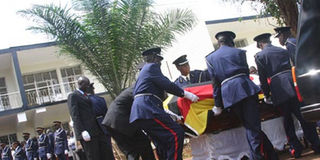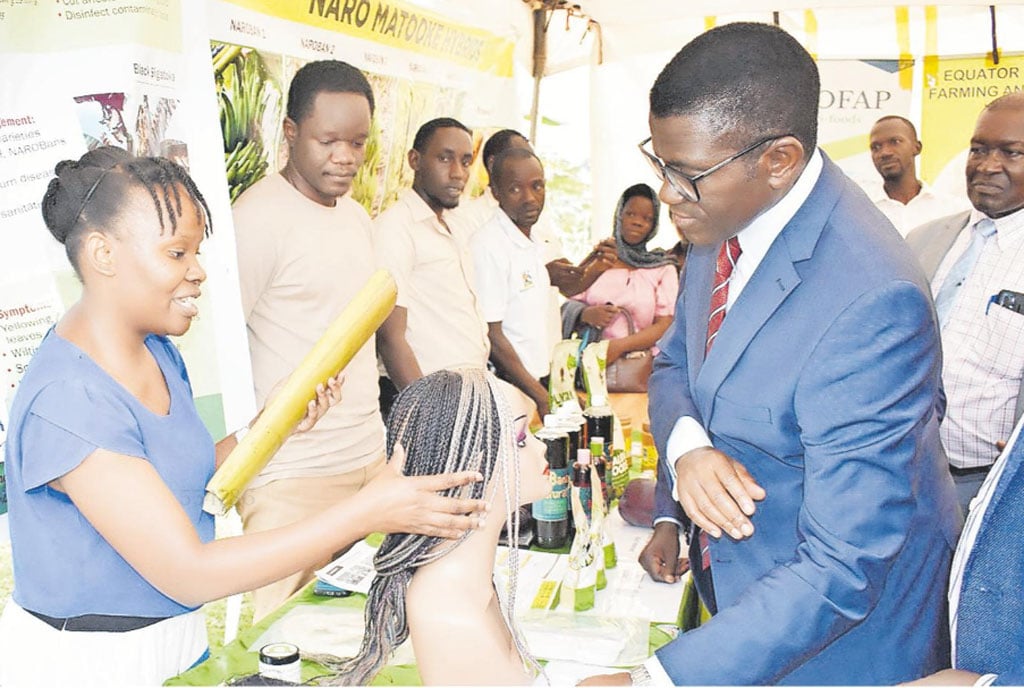Prime
Obote’s last days in SA hospital

Pole bearers remove the body of Obote from a hearse after the former statesman was brought for burial in Uganda. He died in a Johannesburg hospital . file photos
What you need to know:
Life of an icon. In the last part of Dr Henry Opiote’s series on ‘My life with Milton Obote’, the former president’s personal physician recounts their life in Lusaka Zambia where Obote fled to after the 1985 overthrow. He also tells Sunday Monitor’s Henry Lubega about the resistance they faced to have Obote’s body brought back after his death in South Africa
The night we left Kampala [after Obote’s soldiers took over power], Obote’s youngest son was at a friend’s family in Entebbe. He had been taken there because Mama was away and he had playmates at the friend’s place. The eldest son was at school in Namasagali and this meant that we had no time to pick them up.
The youngest was smuggled to Nairobi soon after but the one in Namasagali took some time although the headmaster, Fr Damien Grimes, managed to help him cross over - though it took much longer.
In Nairobi, we stayed with a family friend; a retired judge. While there the Tito Okello-Lutwa regime arranged to have the vehicles we had come with taken back, although by the time we left for Zambia they had not been returned to Uganda.
Soon after our arrival in Nairobi we got information that Chris Rwakasisi had been arrested at the Owen Falls Dam Bridge in Jinja. Mzee [Obote] pleaded with Kenya’s president Daniel arap, saying: “I have heard that one of my ministers has been arrested while following me. Use whatever means you have at your disposal to see to it that nothing terrible happens to him”.
I suspect part of his survival could be attributed to that appeal; Moi must have reached out to the Lutwa’s regime after Obote’s plea.
Life in Zambia
We were in Nairobi for less than a month and left for Lusaka, Zambia. We got a good reception in Lusaka, then under Kenneth Kaunda, but being in exile is a hard thing; you always miss home.
Mzee was treated as a guest of the state; he was given a house with all staff including cooks, cleaners, gate keeper and security.
Obote’s only problem came when he needed things which were not being taken care of by the Zambian government. There are times he wanted personal things like books, magazines and other effects. I had to look for money to get what he wanted.
Sometimes it was difficult to find someone to talk to. Life in Lusaka was not that easy. The Zambian government took responsibility of his heath as well, what would be beyond me the main hospital was nearby, they either joined me or Mzee was taken there. Generally we were covered but of course not in everything as you would if we were home.
During our time in Lusaka, both presidents - Kaunda and later Frederick Chiluba - would often come and see Mzee though on many occasions it was him who went to State House.
However, there were some people who were attacking the Zambian government [just] to create problems for us. I remember one time when Chiluba was president there was a lot of pressure either from here (Uganda) or some other country to send Mzee away from Zambia. Obote’s problem was not coming back: he always insisted that once political parties are returned and the regime returns to democracy it went to the bush to fight for he was ready to come back home.
One time Mzee said Chiluba had said in public that “there are people who have been agitating that I send this man away. I know this man is our state guest it’s not me who called him but when I became president I found him as a state guest, that’s how he was introduced to me. Once in a while I have checked on him as our guest, those of you saying that I should chase him I cannot do because what happened to him can happen to any of you”.
I was always around to oversee his medical problems although I had to go beyond that and look after his social wellbeing and keeping him company. Obote used to send me to check on people he wanted to get in touch with. I used to go to Nairobi to check on the family because for the first few years mama and the children stayed in Nairobi, they used to come and visit [in Lusaka].
I was also responsible for visiting other party members and would brief them on how we were within Zambia on Obote’s behalf. But I didn’t have any special office in the Zambian system although I had some offers from the medical circles which I didn’t take on because that would mean me leaving Mzee alone; which I was not ready to do.
Failing health
Sometime in 1982, Mzee had undergone an operation in Italy and was advised to stop smoking. Unfortunately while in Bombay, India, on a state visit in 1983, he resumed smoking when he received the news of Oyite-Ojok’s death.
This habit persisted even when in Lusaka. One day I presented him with an x-ray of his chest showing how much damage smoking had dealt him. After that, he stopped smoking though there was some bit of drinking alcohol. But I told him smoking would not erase the exile life but would instead ruin his life.
The last days
The trip to South Africa in early October 2005 was part of our preparation to come back home. We took him to South Africa to do a thorough medical review before coming back to Uganda, and it was while there that the kidney problem was discovered. The doctors from Lusaka had escorted him to South Africa, and I was staying in a room next to his.
Mzee’s death was much unexpected, he really looked very well. We were supposed to have been discharged on a weekend but the doctors decided other wise and said we shall be discharged on Monday.
As we waited for the discharge day we went to town for some shopping, while there I got a call asking us to get back to the hospital. By the time we got to the hospital he had normalised but we were not told why they had called us back in such a rush.
After sometime I was called into his private room and this time what I saw was bad news. He could not speak he just looked on blankly; the kidney which had been the cause of his problems had earlier on seemed fine. The dialysis team tried their best when they realised the urine that was coming out was bloody and his entire body system had become toxic. They tried resuscitating him but he was not responding.
Unfortunately he never said a thing which was a very unfortunate thing; he never lived to see his dream of flying from South Africa to Zambia and then fly back home to Uganda come true.
When Mzee died, we delayed with the body in the hospital because there was resistance from here (Uganda) not allowing us to bring back the body.
Just the day before his death he seemed very okay he was asking for local dishes to be prepared for him, and he was looking forward to coming back home.
What Kaunda said
Former Zambian President Kenneth Kaunda in 2005 said he never attempted to reconcile the late Dr Milton Obote and President Yoweri Museveni for fear of being misunderstood.
“I didn’t try at all. I thought I should keep out because I was with Obote. By looking after Obote, I had a responsibility not to let Museveni think I was doing it for Obote. My task was just to look after Obote,” Kaunda said during an interview with the BBC just after the death of Obote.




